|
|
|
Sort Order |
|
|
|
Items / Page
|
|
|
|
|
|
|
| Srl | Item |
| 1 |
ID:
085444


|
|
|
|
|
| Publication |
2009.
|
| Summary/Abstract |
Are violators of international human rights norms punished with lower levels of foreign aid? Despite their abstract preferences, governments often lack the incentive to punish norm violators bilaterally. Multilateral lending institutions, such as the World Bank, could fill the void if they wanted to consider human rights abuses and could bypass restrictions on evaluating the political character of recipients. This article argues that `shaming' in the United Nations Commission on Human Rights, through resolutions that explicitly criticized governments for their human rights records, provided substantive information about rights abuses and gave political cover for the World Bank and other liberal multilateral aid institutions seeking to sanction human rights violators. Statistical analyses support these theoretical claims.
|
|
|
|
|
|
|
|
|
|
|
|
|
|
|
|
| 2 |
ID:
151156


|
|
|
|
|
| Summary/Abstract |
United Nations (UN) General Assembly votes have become the standard data source for measures of states preferences over foreign policy. Most papers use dyadic indicators of voting similarity between states. We propose a dynamic ordinal spatial model to estimate state ideal points from 1946 to 2012 on a single dimension that reflects state positions toward the US-led liberal order. We use information about the content of the UN’s agenda to make estimates comparable across time. Compared to existing measures, our estimates better separate signal from noise in identifying foreign policy shifts, have greater face validity, allow for better intertemporal comparisons, are less sensitive to shifts in the UN’ agenda, and are strongly correlated with measures of liberalism. We show that the choice of preference measures affects conclusions about the democratic peace.
|
|
|
|
|
|
|
|
|
|
|
|
|
|
|
|
| 3 |
ID:
139524
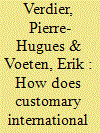

|
|
|
|
|
| Summary/Abstract |
Customary international law (CIL) is a fundamental source of international law. But scholars lack a clear understanding of customary international law, as well as systematic statistical analyses of its workings. Existing theories posit that CIL is a cooperative equilibrium that can be sustained through reciprocity. Yet, CIL lacks institutional features that facilitate reciprocity and is commonly understood to apply universally, even to states that defect or reject a norm. Because the continued existence of CIL depends on state practice, the potential precedential effect of defection encourages cooperation as long as states value the cooperative norm. Consequentially, a state's decision to apply a CIL norm should be a function of the extent to which the norm is practiced in the community of states it interacts with rather than the past behavior of the specific state in an interaction. We test the implications with newly-collected data documenting if and when 121 states switched from absolute to restrictive foreign state immunity. We find no evidence of direct reciprocity. States that most valued absolute immunity and whose defection would most affect others were least likely to defect, but states became more likely to defect as the states whose practice most affected them defected.
|
|
|
|
|
|
|
|
|
|
|
|
|
|
|
|
| 4 |
ID:
085449
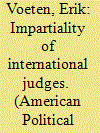

|
|
|
|
|
| Publication |
2008.
|
| Summary/Abstract |
Can international judges be relied upon to resolve disputes impartially? If not, what are the sources of their biases? Answers to these questions are critically important for the functioning of an emerging international judiciary, yet we know remarkably little about international judicial behavior. An analysis of a new dataset of dissents in the European Court of Human Rights (ECtHR) yields a mixed set of answers. On the bright side, there is no evidence that judges systematically employ cultural or geopolitical biases in their rulings. There is some evidence that career insecurities make judges more likely to favor their national government when it is a party to a dispute. Most strongly, the evidence suggests that international judges are policy seekers. Judges vary in their inclination to defer to member states in the implementation of human rights. Moreover, judges from former socialist countries are more likely to find violations against their own government and against other former socialist governments, suggesting that they are motivated by rectifying a particular set of injustices. I conclude that the overall picture is mostly positive for the possibility of impartial review of government behavior by judges on an international court. Like judges on domestic review courts, ECtHR judges are politically motivated actors in the sense that they have policy preferences on how to best apply abstract human rights in concrete cases, not in the sense that they are using their judicial power to settle geopolitical scores.
|
|
|
|
|
|
|
|
|
|
|
|
|
|
|
|
| 5 |
ID:
131486
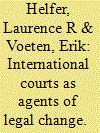

|
|
|
|
|
| Publication |
2014.
|
| Summary/Abstract |
Do international court judgments influence the behavior of actors other than the parties to a dispute? Are international courts agents of policy change or do their judgments merely reflect evolving social and political trends? We develop a theory that specifies the conditions under which international courts can use their interpretive discretion to have system-wide effects. We examine the theory in the context of European Court of Human Rights (ECtHR) rulings on lesbian, gay, bisexual, and transgender (LGBT) issues by creating a new data set that matches these rulings with laws in all Council of Europe (CoE) member states. We also collect data on LGBT policies unaffected by ECtHR judgments to control for the confounding effect of evolving trends in national policies. We find that ECtHR judgments against one country substantially increase the probability of national-level policy change across Europe. The marginal effects of the judgments are especially high where public acceptance of sexual minorities is low, but where national courts can rely on ECtHR precedents to invalidate domestic laws or where the government in power is not ideologically opposed to LGBT equality. We conclude by exploring the implications of our findings for other international courts.
|
|
|
|
|
|
|
|
|
|
|
|
|
|
|
|
| 6 |
ID:
066351


|
|
|
| 7 |
ID:
080045


|
|
|
|
|
| Publication |
2007.
|
| Summary/Abstract |
Theories of government-international court relations assume that judges share an interest in expanding the reach of their court. Yet, casual observation suggests that international judges vary in their activist orientations and that governments selectively appoint judges. This article explores a new data set of dissents in the European Court of Human Rights (ECHR) to estimate the ideal points of judges. The results show that activism-restraint is indeed the main dimension of contestation among judges. Variation in judicial activism cannot be accounted for by different legal cultures of judges or by levels of domestic human rights observance in the judges' countries of origins. Instead, aspiring European Union (EU) members and governments more favorably disposed toward European integration appoint more activist judges. These results imply that politics matters in the appointment of international judges and that EU expansion was an important driving force behind the ECHR's increased activism. More generally, the analysis suggests that agent selection is an important and understudied tool for influencing international organizations
|
|
|
|
|
|
|
|
|
|
|
|
|
|
|
|
| 8 |
ID:
172884
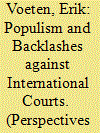

|
|
|
|
|
| Summary/Abstract |
International courts, like domestic courts, protect liberal limits on majoritarianism. This sometimes puts these courts in a position to protect the property rights of the “corrupt elites” that are targeted by populists or the civil liberties of those who are targeted in domestic populist identity politics. Moreover, populism offers an ideology to attack the authority of a court rather than just its individual rulings. An empirical examination illustrates the plausibility of this argument. A large number of backlashes against international courts arise from judgments that reinforce local populist mobilization narratives. Populist backlashes against international courts are not just about sovereignty but often follow efforts to curb domestic courts, usually for similar reasons. Yet populist backlashes do not always succeed, either because populist leaders do not follow up on their exit threats or because populism is too thin an ideology for creating successful multilateral reform coalitions.
|
|
|
|
|
|
|
|
|
|
|
|
|
|
|
|
| 9 |
ID:
076111
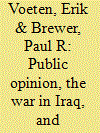

|
|
|
| 10 |
ID:
106952


|
|
|
|
|
| Publication |
2011.
|
| Summary/Abstract |
This short comment seeks to clarify what unipolar politics as usual is, and how it differs from politics as usual under alternative systemic conditions, especially bipolarity. This is an assessment 'from within', accepting Brooks and Wohlforth's description of unipolar politics as well as their central premises that America's lonely superpower status faces no immediate threat and that there is little evidence that powerful states are actively seeking to overthrow the current unipolar system. I suggest that a comparative assessment of how alternative distributions of power create different incentive structures for states yields different conclusions and policy prescriptions than those advanced by Brooks and Wohlforth. Most notably, Brooks and Wohlforth do not fully appreciate how the 'unipolar politics as usual' that they describe provides states with few incentives to cooperate with their policy prescription that the US reshape the world's institutional architecture.
|
|
|
|
|
|
|
|
|
|
|
|
|
|
|
|
|
|
|
|
|